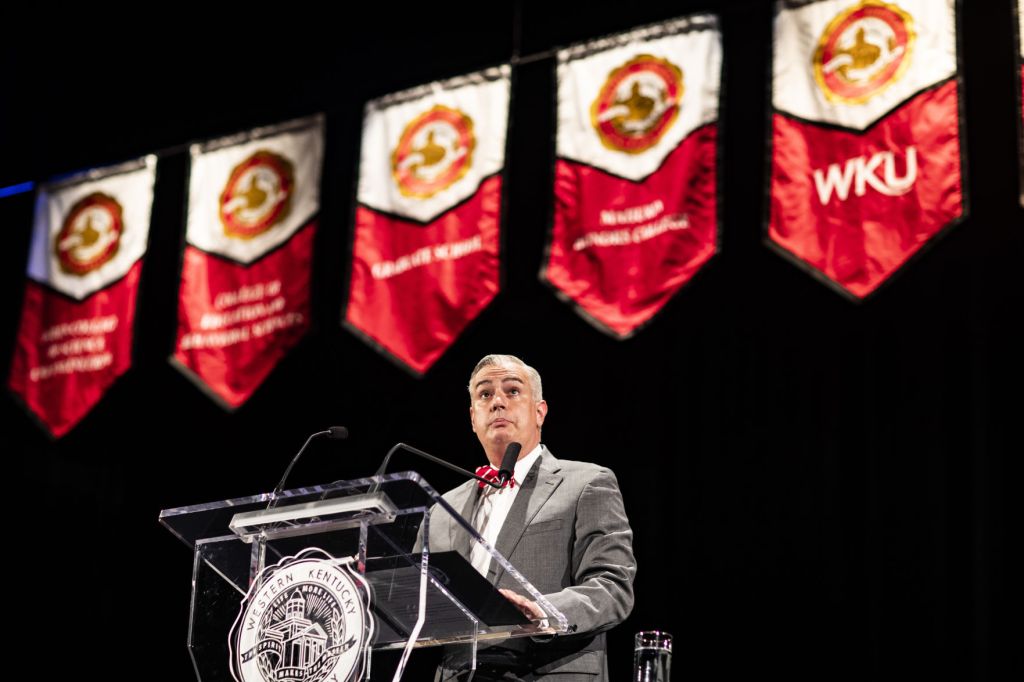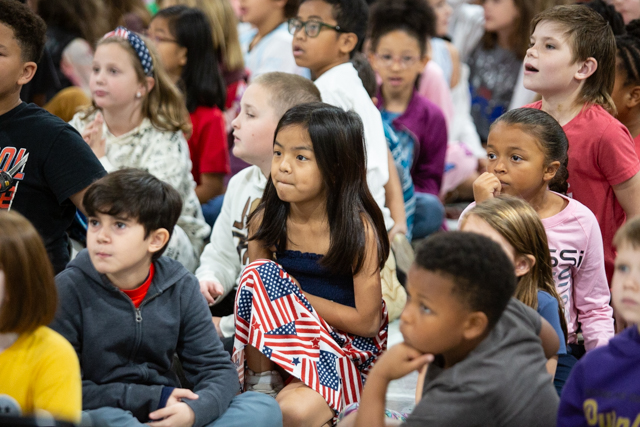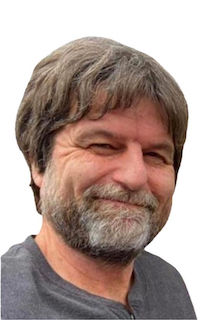WKU reveals initial plans for campus reopening amid pandemic
Published 4:00 pm Thursday, May 28, 2020

- Western Kentucky University President Timothy Caboni speaks Aug. 24 during the WKU convocation at Van Meter Hall.
Western Kentucky University released Thursday a draft version of its plan for reopening campus this fall amid the coronavirus pandemic, a massive undertaking that will involve moving almost 200 classes away from in-person instruction, efforts to “virtualize” classrooms and many other changes.
WKU President Timothy Caboni made one fact abundantly clear.
Trending
“This August will not look anything like last August, and that’s OK,” Caboni told a group of reporters Thursday as the full reopening plan went live at its designated website at wku.edu/restart.
“We all are learning to live beside this virus. It’s not going to go away until we have a vaccine, and that means for us to be able to continue our lives with some semblance of normalcy, we’re going to have to do many things differently,” Caboni said.
Beginning in mid-March, WKU pivoted away from in-person instruction amid the deadly virus outbreak, which has now killed at least 100,000 people in the U.S.
Several campus committees spent weeks drafting campus reopening plans that addressed different aspects of campus life, from academics to student experience, athletics and campus operations.
The plan as it exists now is a draft and is subject to change based on evolving guidance from state and federal officials. Faculty and staff were asked in a campuswide email Thursday to offer feedback on the plan’s website, an option that is also available to the community: “This will be a living document during the course of the summer,” Caboni said.
Recommendations under the plan include:
Trending
Academics
Fall classes would begin in late August as usual, specifically Aug. 24, with M.A.S.T.E.R. Plan kicking off the week before, albeit with reduced session sizes.
Labor Day on Sept. 7 will be used as an instructional day. The final day of in-person instruction will be Friday, Nov. 20. Fall break, which would normally be observed in October, will instead be moved to Nov. 23-24, with the campus also closed that week for the Thanksgiving holiday.
Classes will resume Nov. 30 via remote learning. No in-person instruction or assessments will be permitted for the remainder of the semester, with exceptions approved by department heads and deans.
During this time, residence halls and select dining venues will remain open.
December graduation ceremonies will be postponed and held during spring 2021 with regularly scheduled commencement celebrations.
Final exams will fall on the week of Dec. 7 and will be conducted remotely.
“That final week of classes will be devoted to practical learning, applied projects, online and remote instruction,” Caboni told reporters. “We’re going to get really creative to think about what that last week looks like.”
According to the campus restart plan, at least 190 in-person courses with a capacity of 50 or more students have been identified for potential transition to a distance learning format. Doing so would help free up more than 10,000 seats and help ease congestion on campus. These courses are listed in the plan and students will be informed later this summer if any of their scheduled classes have been transitioned.
Certain classes, such as labs, studios, performance-based courses and clinicals, will get priority for on-campus academic space.
Any courses that take place on campus will need to spread students throughout the classroom space, either by leaving empty desks between students, moving desks further apart or seating fewer students at a single table. The plan also recommends shortening class times by five minutes to help students navigate “newly prescribed paths and routes across campus and throughout academic buildings.” Faculty should “virtualize” their office hours, the plan recommends.
Faculty are being asked to help develop “contingency plans,” should an outbreak on campus necessitate a temporary break, or if teaching faculty become ill and can’t complete the course, among other scenarios.
Social distancing and face masks
Face masks – either a cloth covering or a paper mask over the nose and mouth – will be required at all times in most settings. This includes classrooms and hallways and outdoors when a physical distance of 6 feet cannot be maintained from others, such as during course transition times. This also applies to riding in university cars, vans and buses in particular, which will have reduced capacity, according to the plan.
There are certain exemptions to this general rule and people with physical limitations or health conditions won’t be required to wear them.
Many areas on campus will be reconfigured to limit capacity and encourage social distancing.
“We’re going to have to put Plexiglass up where people have interactions with the Bursar’s Office. We have to have stickers on the floor to say this is where your 6 feet mark is,” Caboni said. “We’ll get used to this over time, but it’s going to take a little bit of upfront investment. Those dollars have been reallocated internally.”
According to the plan, WKU’s Environmental Health and Safety division will conduct a survey of all pedestrian traffic pathways by June 30 “to identify and assess areas where pedestrians cannot maintain social distancing. Where appropriate, physical barriers or other controls, such as transition to one-way traffic patterns or closures, to limit potential exposures will be deployed.”
WKU is also developing plans for on-campus testing, contact tracing and quarantines, Caboni said Thursday. Five staff have been designated to undergo training as contact tracers, he said.
Housing
All residence halls will be open at full capacity, meaning two residents per room. Residents will complete a “revised roommate agreement in which they are able to share any concerns and agree upon conditions related to Covid-19.”
The plan also states: “With the space in the room, residents will be able to social distance with the understanding that they may come in contact with their roommate – which will be considered a member of their household.”
Visitors will be restricted to only WKU students, and each student will only be permitted to check in one guest at a time.
The requirement for freshmen and sophomores to live on campus will continue with the same exemption process in place, the plan stipulates. However, Housing and Residence Life may adjust waiver requirements for students who plan to live at home during the fall semester.
Additionally, a plan for quarantine of residential students has been developed, the plan states: “If needed, quarantine spaces will be available based on (Centers for Disease Control and Prevention) and local Health Department recommendations.”
Move-in for M.A.S.T.E.R. Plan will be extended this fall, and Housing and Residence Life will communicate details with residents.
In announcing the changes Thursday, Caboni aimed to offer a silver lining.
“I think the first step toward recovery is moving toward that restart,” he said, lauding the Board of Regents’ decision Wednesday to keep tuition rates flat this coming school year.
“We want to make sure every young person and their families who want a WKU degree can continue to afford to do that. So we look forward to having all of our students back. Our retention numbers are looking flat, meaning the gains that we had last year, we’re maintaining them, which is amazing in our current environment,” Caboni said.






